Introduction
In today's digital landscape, data is a valuable asset for businesses and individuals alike. The risk of data loss due to hardware failures, cyber threats, or accidental deletions is a constant concern. To mitigate these risks, organizations are turning to cloud-based backup solutions, such as Microsoft Azure. Azure provides a robust and reliable platform for creating a backup repository that ensures data availability, scalability, and security. In this blog post, we will explore the benefits of using Microsoft Azure as a backup repository and highlight the key features and considerations to keep in mind.
The Power of Microsoft Azure
Microsoft Azure is a leading cloud computing platform that offers a wide range of services to support diverse business needs. As a backup repository, Azure provides several advantages over traditional on-premises solutions. Firstly, it offers virtually unlimited storage capacity, allowing organizations to scale their backup infrastructure as their data grows. This scalability eliminates the need for investing in additional hardware or managing complex storage systems.
Secondly, Azure ensures high availability and data durability. With redundant data centers and robust replication mechanisms, Azure guarantees that your backup data is securely stored and readily available when needed. This is particularly important in disaster recovery scenarios, where quick access to backups can be critical to business continuity.
Furthermore, Azure offers flexible backup scheduling and retention policies, enabling organizations to customize their backup strategies according to their specific requirements. Whether it's daily, weekly, or incremental backups, Azure allows granular control over backup frequency and retention periods.
Setting up a Backup Repository in Azure
Creating a backup repository in Microsoft Azure involves a few essential steps. Let's walk through the process:
a. Define your backup requirements: Start by assessing your data protection needs, including the types of data to be backed up, backup frequency, and retention policies. This analysis will help you determine the storage capacity and resources required in Azure.
b. Choose the appropriate Azure storage service: Azure offers various storage options, including Azure Blob Storage, Azure Files, and Azure Backup. Evaluate each service's features and pricing to select the one that aligns best with your backup requirements.
c. Set up storage accounts: Create the necessary storage accounts in Azure based on your chosen storage service. Configure the desired redundancy options, such as locally redundant storage (LRS) or geo-redundant storage (GRS), to ensure data durability and availability.
d. Install and configure backup agents: Install Azure Backup agents on your servers or virtual machines that need to be backed up. These agents facilitate seamless communication between your on-premises or cloud-based infrastructure and Azure.
e. Define backup policies: Configure backup policies in Azure to specify the backup frequency, retention period, and desired backup window. Azure Backup provides a user-friendly interface to manage these policies effectively.
f. Monitor and test backups: Regularly monitor backup jobs to ensure their successful completion. Perform periodic recovery tests to verify the integrity and recoverability of your backup data. Azure's monitoring and reporting tools offer insights into the backup status and help identify potential issues.
Ensuring Security and Compliance
Data security is paramount when it comes to backups. Microsoft Azure offers robust security features to protect your backup repository and ensure compliance with industry regulations. Key security measures include:
a. Encryption: Azure provides built-in encryption mechanisms to safeguard data at rest and in transit. Data stored in Azure Blob Storage or Azure Files can be encrypted using Azure Storage Service Encryption (SSE). Additionally, Azure Backup encrypts data before transmitting it to the cloud.
b. Access control: Azure employs role-based access control (RBAC) to manage user access to the backup repository. Fine-grained access permissions can be assigned to individuals or groups, ensuring that only authorized personnel can manage or restore backups.
c. Compliance certifications: Azure maintains a robust compliance program and has achieved various certifications, such as ISO 27001, HIPAA, and GDPR. These certifications validate Azure's adherence to industry best practices and regulatory requirements, providing assurance regarding data privacy and security.
Cost Optimization and Flexibility
Cost optimization is an essential consideration when implementing a backup repository. Azure offers cost-effective options to optimize your backup strategy, such as:
a. Pay-as-you-go model: Azure follows a consumption-based pricing model, allowing you to pay for the storage and backup services you actually use. This eliminates the need for upfront investments and enables cost scalability based on your data growth.
b. Storage tiering: Azure provides different storage tiers, such as hot, cool, and archive, with varying pricing structures. By tiering your backup data based on its access frequency and retention needs, you can optimize costs without compromising on data availability.
c. Data deduplication and compression: Azure Backup incorporates data deduplication and compression techniques to minimize storage requirements. This reduces the overall backup storage costs and enhances backup performance.
Conclusion
Microsoft Azure offers a comprehensive and reliable platform for creating a backup repository in the cloud. With its scalability, high availability, and robust security measures, Azure ensures the protection and recoverability of your valuable data. By leveraging Azure's features and capabilities, organizations can implement an efficient backup strategy that safeguards against data loss and enables seamless disaster recovery. Whether you are a small business or a large enterprise, Azure provides the tools and flexibility to meet your backup requirements effectively and cost-efficiently. Embrace the power of Azure to ensure the resilience of your data in today's ever-evolving digital landscape.


No comments yet